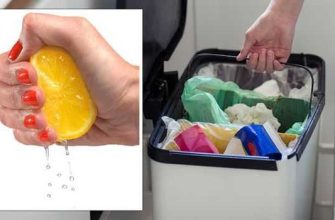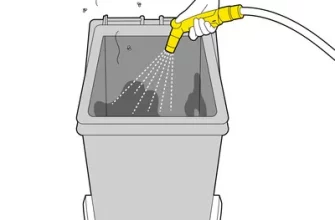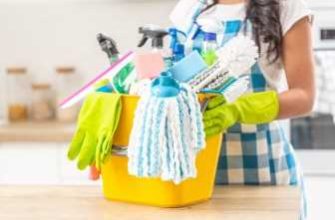
When it comes to keeping your quartz countertops looking shiny and new, it’s important to know what substances you should avoid using. While quartz is a durable and stain-proof material, certain actions can still dull its shine and make it prone to damage. In this expert guide, we’ll explore the top substances that should be kept away from your quartz worktops, as well as practical tips for cleaning and maintenance.
Quartz countertops are known for their non-porous surfaces, which means they do not absorb liquids or stains like other materials. However, this doesn’t mean that you can use any cleaners or disinfectants on them without caution. For example, using abrasive cleaners or scrubbing pads can cause scratches and dull the countertop’s finish. Likewise, harsh chemicals like Clorox or ammonia can also damage the surface and strip away the seal that keeps your quartz worktop shiny.
Instead, it’s best to stick to gentle and mild cleaning solutions when caring for your quartz countertops. A mixture of mild soapy water or a non-abrasive cleaner is usually sufficient for most spills and messes. Wiping down the countertop with a soft cloth or non-scratch sponge in a gentle circular motion will help keep it clean and shiny. For tougher stains, you can use a mild vinegar solution, but be sure to thoroughly rinse and wipe the countertop afterwards to prevent any residue.
Another important tip is to always use trivets or cutting boards when working with knives or hot objects on quartz countertops. While quartz is heat-resistant, extreme temperature changes can still cause it to chip or crack. By using trivets and cutting boards, you can protect your worktop from these potential damages.
To keep your quartz countertops looking their best, it’s also recommended to seal them regularly. This means applying a sealant that will help protect the surface from stains, scratches, and dullness. Be sure to follow the manufacturer’s instructions for the specific sealant you’re using, as different brands may have different recommendations.
In summary, when it comes to cleaning and maintaining your quartz countertops, it’s important to avoid using abrasive cleaners, harsh chemicals, and scrubbing pads. Stick to gentle cleaning solutions like mild soapy water or non-abrasive cleaners, and wipe the countertop in a circular motion. Use trivets and cutting boards to protect the surface from knives and hot objects, and seal the countertops regularly to keep them looking shiny and new for years to come.
Avoid Harsh Chemical Cleaners

When it comes to cleaning your quartz countertops, it’s important to avoid using harsh chemical cleaners. These cleaners can cause damage to the surface of your countertops and may leave behind a film or residue that is difficult to remove.
While it may be tempting to use a strong cleaner to tackle tough stains or spills, it is best to opt for gentler cleaning solutions that are specifically formulated for use on quartz surfaces. Using harsh chemicals can strip away the seal on your countertop, leaving it vulnerable to staining and damage.
Some common household cleaning products that should be avoided when cleaning quartz countertops include bleach, Lysol, and oven cleaner. These products are not meant to be used on quartz surfaces and can cause discoloration or even dull the finish of your countertops.
Instead, opt for mild, non-abrasive cleaners that are safe to use on quartz countertops. Many manufacturers offer their own line of cleaning products that are specifically designed to clean and protect quartz surfaces. These products are often the best choice for routine cleaning and can help to prevent staining and keep your countertops looking their best.
If you do encounter a tough stain or spill on your quartz countertops, it’s important to act quickly to remove it. Wipe up any spills as soon as possible and use a soft cloth or sponge to gently clean the area. Avoid using abrasive pads or scrub brushes, as these can cause scratches on the surface of your countertops.
If you’re unsure about which cleaning products to use or how to properly clean your quartz countertops, consult the manufacturer’s instructions or reach out to a professional for assistance. They can provide you with tips and solutions for keeping your countertops clean and free from damage.
In summary, it’s best to avoid using harsh chemical cleaners on your quartz countertops. These products can dull the surface, cause discoloration, and even void any warranties provided by the manufacturer. Instead, opt for mild, non-abrasive cleaners and follow proper cleaning procedures to keep your countertops looking their best.
Steer Clear of Abrasive Scrubbing Pads
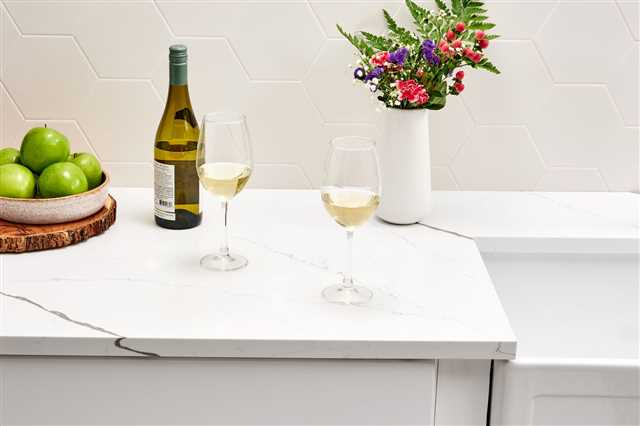
When it comes to cleaning your quartz countertops, it’s important to be cautious and avoid using any abrasive scrubbing pads. These pads can potentially damage the surface of your countertops, leaving behind unsightly scratches that can be difficult or even impossible to repair.
While it may be tempting to use a professional-grade scrubbing pad to tackle tough stains or grime, this is not recommended for quartz countertops. The abrasive nature of these pads means they can easily strip away the protective layer on the surface of your countertops, leaving them vulnerable to stains and etching.
If you have a stubborn stain that regular cleaning methods aren’t removing, it’s best to consult with the manufacturer or a professional for advice. They may be able to recommend a cleaner or a specific cleaning technique that is safe for use on your countertops.
Instead of using abrasive scrubbing pads, you can clean your quartz countertops using a mild soap or detergent and a non-abrasive cloth or sponge. Avoid using any cleaners that contain bleach, ammonia, or vinegar, as these substances can cause damage to the surface of your countertops.
Above all, remember to always use a gentle motion when cleaning your quartz countertops. Avoid using excessive force or scrubbing too vigorously, as this can also lead to scratches or other damage.
- Wipe down the countertops daily with a damp cloth or sponge and a mild soap or detergent.
- If you have spills or stains, clean them up immediately to prevent them from setting in.
- For tougher stains, you can create a paste using baking soda and water. Apply the paste to the stain, let it sit for a few minutes, then gently scrub with a non-abrasive sponge or cloth.
- Never use abrasive pads, steel wool, or scrub brushes on your quartz countertops.
- Avoid using harsh chemicals or cleaners, such as oven cleaner, glue remover, or paint thinner, as these can damage the surface of your countertops.
- When using disinfectant wipes or sprays, ensure they are safe for use on quartz surfaces.
- Use trivets or hot pads under hot pans or pots to avoid thermal shock and potential damage to your countertops.
- If you want to add shine to your countertops, use a quartz countertop polish recommended by the manufacturer.
- Regularly seal your quartz countertops if recommended by the manufacturer to help protect against stains and scratches.
By following these tips and avoiding the use of abrasive scrubbing pads, you can ensure that your quartz countertops stay looking beautiful for years to come.
How to Clean Quartz Countertops Like a Pro
Quartz countertops are a popular choice for many homeowners due to their durability and low maintenance. To keep your quartz countertops clean and looking their best, follow these expert tips:
- Start with a gentle cleaner: When it comes to cleaning quartz countertops, it’s important to use a cleaner that is specifically designed for this surface. Avoid using harsh chemical cleaners or abrasive scrubbers, as they can damage the quartz and leave scratches.
- Read the manufacturer’s instructions: Before using any cleaning solution, always read and follow the manufacturer’s instructions. They will provide specific guidance on how to clean and care for your particular quartz countertop.
- Avoid using Windex or vinegar: While Windex and vinegar are popular household cleaners, they are not suitable for quartz countertops. These cleaners can dull the surface and affect its shine over time.
- Remove spills and stains promptly: To prevent stains from setting in, always clean up spills as soon as they happen. Use a mild cleaner and a soft cloth or sponge to gently wipe away the spill in a circular motion.
- Avoid using abrasive sponges or scrubbers: When cleaning quartz countertops, opt for a soft cloth or non-abrasive sponge. Avoid using scrubbers or sponges with rough surfaces, as they can scratch the quartz.
- Use gentle cleansers: If your quartz countertop requires more than just a quick wipe down, opt for a gentle cleanser that is specifically formulated for quartz surfaces. These cleansers are designed to remove tough stains without damaging the quartz.
- Be cautious with nail polish and nail polish remover: Nail polish and nail polish remover can cause permanent damage to quartz countertops. Avoid using these products near your countertop, and if a spill does occur, clean it up immediately.
- Don’t use bleach or harsh chemicals: Bleach and other harsh chemicals can discolor or damage quartz countertops. Avoid using these substances, and instead opt for mild cleansers that are safe for use on quartz.
- Keep the countertop dry: To maintain the shine and prevent stains, make sure to wipe down your quartz countertop with a dry cloth or paper towel after cleaning. This will help remove any excess moisture.
- Follow up with a quartz cleaner: After cleaning your countertop, consider using a quartz cleaner to enhance its shine. These cleaners are specifically formulated to make quartz countertops look their best.
Following these tips will help keep your quartz countertops looking shiny and clean for years to come. Remember to always check the manufacturer’s instructions and use gentle cleaners and tools when caring for your quartz countertop.
Start with Mild Dish Soap and Warm Water
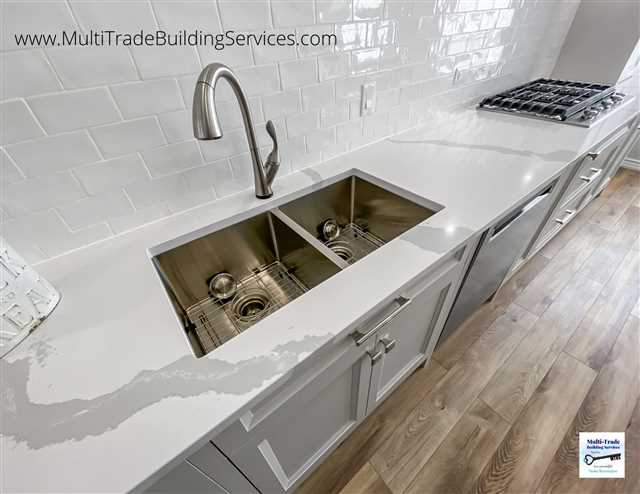
Cleaning quartz countertops is a simple and straightforward process. To keep your countertops looking clean and pristine, start by using a mild dish soap and warm water solution.
Here are some tips to effectively clean your quartz countertops:
- First, wipe off any loose debris or spills with a soft cloth or sponge. Avoid using any abrasive materials, such as steel wool or scouring pads, as they can scratch the surface.
- Create a mixture of mild dish soap and warm water. This solution is gentle enough to clean the quartz countertop without causing any damage.
- Dampen a soft cloth or sponge with the soap and water solution. Gently wipe the surface of the countertop, paying extra attention to any stains or spills.
- If there are any stubborn stains or spills that cannot be removed with the soap and water solution, you can use a non-abrasive cleaner specifically designed for quartz countertops. Follow the manufacturer’s instructions for the best results.
- After cleaning, rinse the countertop thoroughly with clean water to remove any soap residue. Dry the surface with a soft cloth to prevent water spots or streaks from forming.
Remember, when it comes to cleaning quartz countertops, it’s important to avoid using certain products and substances. For example, avoid using bleach, oven cleaner, or any abrasive cleaners that contain harsh chemicals. These products can damage the quartz and cause it to become dull or lose its luster.
In addition to regular cleaning, there are a few other tips to keep in mind to maintain the beauty and longevity of your quartz countertops:
- Use cutting boards and avoid cutting directly on the quartz surface. While quartz countertops are scratch-resistant, using a knife directly on the surface can still cause scratches over time.
- Place hot pots and pans on trivets or hot pads. While quartz countertops have heat resistance, prolonged exposure to high heat can damage the resin-bound quartz and cause it to crack.
- Re-seal your quartz countertops every few years. While quartz is a low-maintenance surface, it’s still important to seal it periodically to maintain its resistance to stains and scratches.
- Avoid placing heavy objects on the countertops. While quartz is a durable material, excessive weight or pressure can cause it to crack or chip.
In conclusion, cleaning quartz countertops is a simple and practical task. By using mild dish soap and warm water, you can remove stains and spills without scratching the surface. Remember to avoid using harsh chemicals or abrasive cleaners, and follow these tips to keep your quartz countertops looking beautiful for years to come.
Use a Non-abrasive Cloth or Sponge
When it comes to cleaning your quartz countertops, it’s important to use a gentle cleaning tool. Using an abrasive cloth or sponge can cause scratches on the surface, which can dull the shine and make the quartz more susceptible to stains. It’s also important to avoid using any cleaners that are not specifically designed for quartz, as they can damage the surface as well.
A non-abrasive cloth or sponge is the best tool to use when cleaning your quartz countertops. These materials are soft and won’t scratch the surface. You can use them with a mild soap and water solution to clean up spills and remove dirt or grime. It’s always a good idea to wipe up spills as soon as possible to prevent staining.
Frequently Asked Questions:
- Can I use Windex or vinegar to clean my quartz countertops?
- Can I use bleach or Lysol wipes on quartz countertops?
- What about using baking soda or a magic eraser?
No, it is not recommended to use Windex or vinegar on quartz countertops. These cleaners can damage the surface and cause it to lose its shine.
No, bleach and Lysol wipes are not safe to use on quartz countertops. These cleaners can cause discoloration and damage to the surface.
Baking soda and magic erasers should also be avoided. These materials can be abrasive and potentially scratch the surface of the quartz.
When it comes to stubborn stains, a mild soapy water solution or a specialized quartz cleaner should do the trick. Be sure to wipe down the countertops afterwards to remove any residue. If a spill occurs, it is best to clean it up as soon as possible to prevent any liquids from seeping into the quartz.
| Do’s | Don’ts |
|---|---|
|
|
In some cases, you may encounter a stain that is difficult to remove with soap and water alone. If this happens, you can try using a little bit of non-abrasive cleaner specifically made for quartz countertops. These products are designed to effectively remove stains without damaging the surface. Always follow the manufacturer’s instructions when using these cleaners.
If you’re dealing with a spill that has dried or hardened, you can try gently scraping it off with a plastic scraper or credit card. Be careful not to use anything sharp that could scratch the surface. After removing the residue, clean the area with a mild soap and water solution to ensure all traces of the spill are gone.
Remember, quartz countertops are not completely stain-proof, so it’s important to take precautions to keep them looking their best. By following these guidelines and using the right cleaning tools and products, you can keep your quartz countertops looking beautiful for years to come.
Don’t Forget to Regularly Seal the Surface
When it comes to quartz countertops, one important aspect that many people overlook is the regular sealing of the surface. Although quartz countertops are often marketed as being stain-proof and resistant to damage, they are not completely impervious to stains, scratches, or heat. That’s why it is essential to take proper care of them in order to maintain their pristine appearance and longevity.
Sealing the quartz countertop is a simple yet crucial step in preventing stains and other forms of damage from occurring. Sealing creates a protective barrier that helps to repel liquids and minimize the risk of permanent stains. It works by filling in the pores and microscopic gaps on the surface of the quartz, making it more resistant to absorbing liquids and retaining moisture.
So, how often should you seal your quartz countertops? Well, it depends on the type of sealant you use and the manufacturer’s instructions. Some manufacturers recommend sealing every six months, while others suggest sealing once a year. It’s best to follow the instructions provided by the manufacturer or seek professional advice to ensure you’re sealing your quartz countertops at the right frequency.
The process of sealing is relatively simple. Start by thoroughly cleaning the quartz countertop surface to remove any dirt, spills, or residues. Use a mild soap solution or a quartz-specific cleaner and a soft cloth or sponge to wipe down the surface. Make sure to dry it completely before proceeding.
Next, apply the sealant to the quartz countertop according to the manufacturer’s instructions. There are various types of sealants available on the market, such as spray-on or wipe-on options. Some sealants require multiple coats, while others only need one. Make sure to follow the instructions carefully to achieve the best results.
After applying the sealant, allow it to dry completely before using the quartz countertop again. This may take a few hours or overnight, depending on the specific sealant and the environmental conditions. Once the sealant is dry, you can resume using your countertop as usual.
Regularly sealing your quartz countertop helps to ensure its long-term resistance against stains, scratches, and other forms of damage. It’s a simple maintenance task that can go a long way in preserving the beauty and functionality of your countertop. So don’t forget to include regular sealing in your quartz countertop maintenance routine!

